DPLI Jawi Jun 2010
Tuesday, June 15, 2010
Monday, June 14, 2010
Ancient Route, Heritage Should Be Preserved
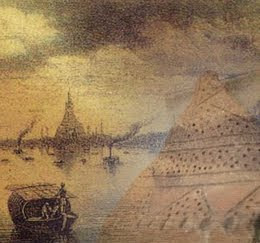
The Institute of Malay World and Civilisation (ATMA) is tracing an ancient route crossing from the east coast to the west coast of Peninsular Malaysia used from the pre-historic years (metal age) until the days of the Malacca Sultanate.
This route was later also used by Japanese soldiers when they overran the country during the second world war and later by the communist terrorists during the emergency. The route includes rivers and overland paths.
Research to trace the routes was started by the late Prof Dr Norhalim Ibrahim when he was with ATMA last year. ATMA is continuing with the research to locate the routes exact sites since it can attest to the country’s rich heritage.
The current research is being carried out by Senior Research Fellow at ATMA, Asso. Prof Dr Asyaari Muhamad with the cooperation of ATMA’s Principal Research Fellow, Prof Dato’ Dr Nik Hassan Shuhaimi Nik Abdul Rahman and a lecturer from the Faculty of Social Sciences and Humanities (FSSK) Dr Norazuan Ibrahim. The project was given a grant of RM75,000 by Fundamental Research Grant Scheme (FRGS).
They have traced the route from Pekan to Kuala Bera and Tasik Bera through to Kg Tambanangan, Kg Lubuk Ladang and on Muar. The route also goes through Bahau, Negeri Sembilan and to three rivers, Sungai Serting, Sungai Jempol to Sungai Muar.
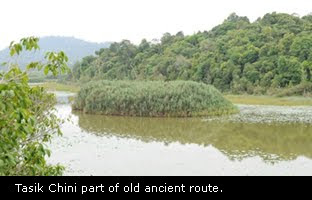
The route was also used by the Siamese and later the British. However today the route is no longer in use following developments in some areas. If research is not carried out whatever historical remains along the routes could be lost forever without them being known.
Dr Asyaari expressed regret that no effort had been made to preserve the historical sites like the one found in Muar when it was a popular staging post and meeting place for traders. The abandoned route, he said, are significant politically, culturally and socially as they had also been used by some nationalist figures.
The famous Malay warrior, Mat Kilau used the old route to travel back to his village in Pahang as was the legendary Hang Tuah who used it to travel back from Pahang to Malacca.
Traders and Muslim preachers had also travelled along the route to spread Islam to locals living along the way. This is evident with the discovery of an old site for a surau at Kg Serang, Kuala Pilah which showed there were religious activities carried out along the ancient route.
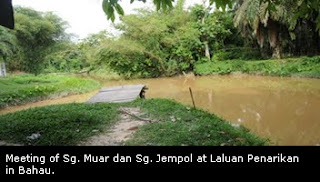
Researchers had also found an old metal coin at Tasik Chini said to be used for trading transactions.
A lot of information were gathered from the Orang Asli community as well as the local residents but they have to be sieved to differentiate facts from myths, said Dr Asaari.
The research team is getting the assistance of some academic staffs from the Faculty of Social Sciences and Humanities to plot the routes using GIS to compare them with the existing ones.
He said western scholars had not given much attention to the old routes and had thus not done any research on the routes.
ATMA is also doing a research project on multidiscipline aspect of visual arts that includes details involving research from the archeological, historical, geographical aspects to preserve it for posterity.
The research on visual arts is important because of its relationship to many branches of arts including carvings, weaponary, ceramics and engravings done by Muslims living in the area.
Two research papers on the subjects will be presented in a seminar next month that will describe the role of visual arts and their significance to society. Findings of the research will be presented attesting to why they should be preserved said, Dr Asyaari.
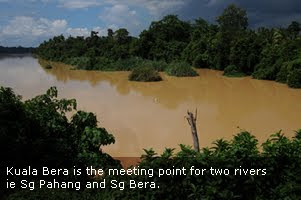
Malaysian Astronaut In A Race To Save The World
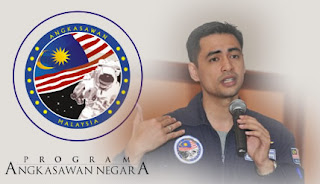
Sheikh Muszaphar Shukor, who was selected from 11475 people in the Malaysian space programme, is the first and to date the only Malaysian astronaut that was beamed up to space in 2007. Though he was the ninth Muslim to be in space he is perhaps the first Muslim who went to space without being apologetic of his faith.
Islam in Space
He observed fasting during Ramadhan in space and was supplied with a formal guideline a book entitled A Guideline of Performing Ibadah (worship) at the International Space Station (ISS)” which was approved by Malaysia’s National Fatwa Council.
“I want to share with the world what Islam is all about. When I went to space I do not want to focus only on science; I wanted to involve Islam and the arts. I want to show particularly to the Islamic world that no matter where you are you have to do your prayers, no one knows how it is done, I want it to be a reference for future Muslims going to space” said Sheikh Muszaphar.
Bigger Picture
When he went to space he saw how beautiful the earth looks, a stark contrast to the conflicts that exist within. It changes his perspective in life.
“You are not into small petty things anymore, I am not caught up into the emotional things I am more into the bigger issues, such as pollution, environment , hunger, women suffering and children dying. I been to Afghanistan, I been to Cambodia and recently I was in Palestine, so I am hoping to make this world a better place,” said Sheikh Muszaphar
For the past five years he only sleeps 4 hours a day, he devoted his time to good cause and work closely with NGO’s. He is the ambassador for Global peace, youth and breast cancer.
Sheikh Muzaphar is rushing all the time trying to rake as many good causes as he can to help make this world a better place. According to him there is no rule that says you must stick to one cause at a time.
“My advice to people; life is short and do the things that you want, you have to be passionate in the things that you do, that way you don’t get tired,” said Sheikh Muszapha.
Celebrity Role
Some of his fellow scientists question his willingness to play the role of celebrity because it clouds the whole point of going to space which is research for the benefit of mankind.
“The best thing about being an astronaut is you are able to make changes, you are able to make your voice heard, this is what I always wanted to do. If I have to play the role of a celebrity so be it,” Sheikh Muszapha.
An Islamic Space Agency
Sheikh Muszapha feels that whoever controls space will control the world because the technology that you learn is so much. “That’s why I am trying to reach out to the Islamic world. I have given many thoughts to the Middle East and I am hoping to unite the Islamic world and bringing back the glory of Islam in science, mathematics and astronomy like we were known before.
“I am hoping to set up an Islamic space agency, I am trying to gather all Muslim scholars under one roof, the old and the young, and put them under the Islamic Space Agency. Right now Western science is severed from religion with this Islamic Space Agency science will use the Quran to find answers that can benefit Muslims. I believe if science and religion is united once again mankind can achieve greater heights”.
Malaysia Is Ready For Nuclear Energy

Malaysia is ready to operate its own Nuclear Power Plant (NPP) and will not face any problems as it has enough qualified manpower to oversee the implementation and operation of a nuclear powered electricity generating plant (NPP). In fact, Malaysia has been sending its officers to Australia for training in nuclear science since 1985.
Safety is an important consideration in having an NPP and will not be ignored, said Professor Emeritus Datuk Dr Nooramly Muslim, Chairman of Malaysian Atomic Energy Licensing Board.
Prof Nooramly who is also with the Faculty of Science and Technology, Universiti Kebangsaan Malaysia said that Malaysia has already produced about 900 graduates in nuclear science from UKM including masters and PhD holders, 95% of whom are in the country who have the expertise and experience to run NPP.
“Actually we need a start-up time of between 10 to 15 years before the plant can be brought into operation following the government’s decision to have its first NPP plant in 2021,” he told UKM News Portal in an exclusive interview during the two-day workshop on Nuclear Energy which was held here.
Some 33 nuclear experts from 14 countries attended the workshop hosted jointly by UKM and University of Tokyo.
Malaysia will follow Indonesia, Vietnam and Bangladesh which will be using their first NPP in 2020.
Nooramly said Bangladesh even though not as industrialised as Malaysia will have its NPP in 2020. It can also tap into the thousands of its experts and staff trained in nuclear science now working in advanced countries.
He said even thought the cost of buildidng a NPP is very high up to US$6billion, depending on its size and where it is sited, it can be in operation for about 60 years and will benefit up to two or three generations.
Touching on the fear of the people for such a plant, Nooramly feels there awas a lack of information abaout nuclear power and the authorities needed to keep the people informed of its advantages. Countries in Europe like Switzerland and Britain which had stopped using NPP at one time are now using it again.
Nuclear power is clean but the people have the wrong perception which in part is also due to the misuse of nuclear weapons in the second world war.
“People talked about safety but remember there had only been two accidents involving NPP. But these are due to human errors and the lack of safety devices. Today’s second and third generation NPPs are safer and we will build our NPP incorporating these new safety measures and sophisticated technology.
The General Manager, Department of International Affairs of the Japan Atomic Industrial Forum Incorporation, Mr Tomohiko Kita, said that Japan have the experience having used nuclear energy for some 50 years.
“No doubt we were the victims of misuse of nuclear weapons but that was during the war. Today we teach our children while in school on the good use of nuclear power. I live in Hiroshima and we teach children from young about nuclear energy and power. You can learn from our experiences in educating the people to accept nuclear power,” he said.
He said Japan, Korea, France and Russia may offer some financing packages for the Malaysian NPP. Hitachi, Mitsubhishi and Toshiba are nuclear vendors. “Maybe we can propose a package that includes teaching, training of staffs, technology transfer, construction and maintainance.
Previously people are scared about safety of NPP but no longer so with all the safeguards in place Tomohiko said.
ISLAM IN EUROPE: CURRENT TRENDS AND FUTURE CHALLENGES

Media portrayals of Muslims in Europe are overwhelmingly negative. It is crucial to put in context what is written in the newspapers or said on TV about the everlasting incompatibility between Islam and democracy, Islam and gender equality, Islam and modernity, and relationships between Muslims and non-Muslims. This lecture is a synthesis of a trip in 2007 to France and The Netherlands to get a first-hand look at the types of concrete conflicts that emerge from religious issues and cultural issues in contemporary Europe. It is an exploration for answers to questions such as: How far can secularized European societies cope with religious plurality? Are the public controversies such as the headscarf debate in France and the Swiss ban on Minarets really about religion? How does the public stigmatization of Muslims and Islam affect daily practices of citizens? How do we make sense of the appeal of religious extremism for some young Muslims in Europe? The completely different French and Dutch models of multiculturalism and integration of Muslim immigrants make for an interesting contrast of how best to integrate Islam and Europe. The lecture will attempt to tease out some lessons in all this for the U.S.A. and Malaysia.
Speaker :: Professor Samuel O. Imbo
Date :: 17/06/2010
Time :: 03:00 pm
Location :: Katha Seminar Room, Centre for Civilisational Dialogue
Registration :: Free for all participant
Open to :: Public , Staff , Student & Alumni
Contact :: Centre for Civilisational Dialogue Staff,
dialog@um.edu.my
Tel No. : 603-79675697
Fax No. : 603-79675692
World Halal Research Summit 2010

This International Summit is a platform for scientists, researcher, scholars, and academicians to present, share and exchange ideas on new research findings, emerging technologies, product innovations, issues and chanllenges in the global Halal Industry. Malaysia is focusing on a more holistic approach to develop a "Halal Eco-System" in making Malaysia as a Global Halal Hub through research and development.
Date : 23rd to 25th June 2010
Venue : Kuala Lumpur Convention Centre (KLCC)
PENGUMUMAN PENTING
Blog ini dibangunkan khas untuk memenuhi tugasan KPT5033-Teknologi dan Inovasi Dalam Pendidikan. Diploma Pendidikan MARA-UPSI KOHORT 3 (2009-2011)
Subscribe to:
Posts (Atom)